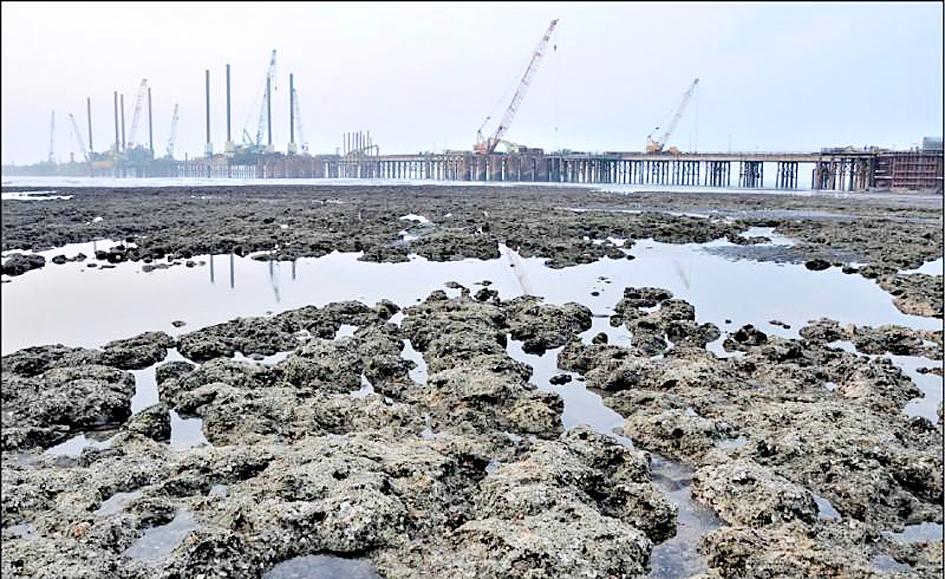The Ministry of Economic Affairs’ latest proposal for a proposed third liquefied natural gas (LNG) terminal off the coast of Datan Borough (大潭) in Taoyuan’s Guanyin District (觀音) yesterday failed to make it out of the first environmental impact assessment (EIA) committee meeting at the Environmental Protection Administration (EPA).
The ministry said that if the project cannot go ahead as planned, “13.7 billion kilowatt-hours of power per year, equivalent to 5 million tonnes of coal,” would be missing from Taiwan’s power generation capacity.
That would set Taiwan’s decarbonization targets back, the ministry said, while environmental groups said that the proposal is still too disruptive to the fragile algal reef habitat off the coast of Datan.

Photo: Taipei Times file photo
Although some members of the committee, which was composed of field experts, supported the project, the committee’s conclusion after a public hearing and a closed-door discussion was that “more information is required” from CPC Corp, Taiwan (台灣中油), which was instructed to clarify 14 points before it can hope to execute the project.
Deputy Minister of Economic Affairs Tseng Wen-sheng (曾文生), who said he was not disappointed by the result, promised to return to the proposal “in good faith” to see whether it could be “adjusted to accommodate the concerns of the committee members.”
“There were no expectations that this would be a swift process,” Tseng said. “We are aware that the assessments take time and, indeed, it would be unprecedented for the EPA to give this project the green light before December’s referendums.”
A referendum on the project is to be held on Dec. 18.
Rescue Datan’s Algal Reefs Alliance convener Pan Chong-cheng (潘忠政) criticized the ministry for holding a news conference before the committee meeting to underline the importance of the project to Taiwan’s energy security.
“They were trying to influence the outcome of the committee,” Pan said ahead of the meeting, calling on the government to hold public hearings.
Tseng told the news conference that the ministry “had a duty to speak out” due to the terminal’s importance to the nation’s energy transition policy, which would lower the amount of power generated from coal-fired plants from 40 percent to 30 percent and increase the amount generated from LNG-powered plants from 40 percent to 50 percent.
“I wish that environmental groups would look at the big picture when it comes to protecting the environment,” Tseng said, adding that LNG, although a fossil fuel, releases about half the greenhouse gasses of coal.
Without the proposed third terminal, Taiwan’s two existing terminals could not receive enough LNG to supply the Datan power plant, he said.
“Not only Taiwan’s decarbonization goals, but our plans for energy stability would be affected,” he said.
Although alternative sites had been proposed for the terminal, Tseng said they would have set the project back by at least a decade.

The Ministry of the Interior (MOI) is to tighten rules for candidates running for public office, requiring them to declare that they do not hold a Chinese household registration or passport, and that they possess no other foreign citizenship. The requirement was set out in a draft amendment to the Enforcement Rules of the Public Officials Election and Recall Act (公職人員選舉罷免法 ) released by the ministry on Thursday. Under the proposal, candidates would need to make the declaration when submitting their registration forms, which would be published in the official election bulletin. The move follows the removal of several elected officials who were

The Republic of China (ROC) is celebrating its 114th Double Ten National Day today, featuring military parades and a variety of performances and speeches in front of the Presidential Office in Taipei. The Taiwan Taiko Association opened the celebrations with a 100-drummer performance, including young percussionists. As per tradition, an air force Mirage 2000 fighter jet flew over the Presidential Office as a part of the performance. The Honor Guards of the ROC and its marching band also heralded in a military parade. Students from Taichung's Shin Min High School then followed with a colorful performance using floral imagery to represent Taiwan's alternate name

COVETED PRIZE: The US president would be a peace prize laureate should he persuade Xi Jinping to abandon military aggression against Taiwan, William Lai said US President Donald Trump should get the Nobel Peace Prize should he be able to convince Chinese President Xi Jinping (習近平) to abandon the use of force against Taiwan, President William Lai (賴清德) told a conservative US radio show and podcast in an interview. The US is Taiwan’s most important international backer, despite the absence of formal ties, but since Trump took office earlier this year he has not announced any new arms sales to the nation. Trump could meet Xi at the APEC summit in South Korea on Oct. 31 and Nov. 1. Lai, speaking on The Clay Travis and Buck Sexton

A Chinese takeover of Taiwan would severely threaten the national security of the US, Japan, the Philippines and other nations, while global economic losses could reach US$10 trillion, National Security Council Deputy Secretary-General Lin Fei-fan (林飛帆) wrote in an article published yesterday in Foreign Affairs. “The future of Taiwan is not merely a regional concern; it is a test of whether the international order can withstand the pressure of authoritarian expansionism,” Lin wrote in the article titled “Taiwan’s Plan for Peace Through Strength — How Investments in Resilience Can Deter Beijing.” Chinese President Xi Jinping’s (習近平) intent to take Taiwan by force